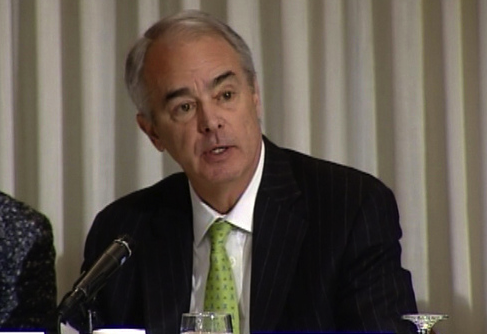Should Environmentalists Ever Count On Their "Enemies" To Make Change?
BY FC EXPERT BLOGGER JIGAR SHAH, Fast company,This blog is written by a member of our expert blogging community and expresses that expert's views alone.
Some people fighting for climate change legislation have apparently taken the position that beggars can’t be choosers.

The need to choose good partners to make change might seem obvious. But in the current political and economic climate, some environmentalists apparently have taken the position that beggars can’t be choosers.
I just finished reading The Climate War by Eric Pooley, a book about the failed political battle to get Congress to take legislative action on global warming. In the book, Pooley describes the extraordinary efforts by former Vice President Al Gore, the Environmental Defense Fund’s Fred Krupp and Duke Energy CEO Jim Rogers (pictured below) to get comprehensive national climate legislation passed.
Pooley portrays Jim Rogers as a man divided by his passion for climate mitigation on the one hand and his fiduciary responsibility to shareholders and ratepayers on the other. This may be an apt description of many CEOs I have met that have publicly pushed for comprehensive climate legislation. But in the case of Jim Rogers, a more appropriate conclusion might be that he is only involved in climate legislation efforts to make sure that new laws enrich his shareholders.
 The relationship between Krupp and Rogers dates back to 1990, when the two men worked together on amendments to the Clean Air Act of 1990 that legislated a cap and trade approach to reducing sulfur and nitrogen emissions from coal plants. Both called their victory good for the environment and the economy.
The relationship between Krupp and Rogers dates back to 1990, when the two men worked together on amendments to the Clean Air Act of 1990 that legislated a cap and trade approach to reducing sulfur and nitrogen emissions from coal plants. Both called their victory good for the environment and the economy.As head of the Environmental Defense Fund, Krupp wanted to test his theories on cap and trade. Rogers was the new CEO of Public Service of Indiana (PSI), a failing electric utility that, it is important to note, was turned around in part by the free allocations of valuable emission credits that it received under the bill. These credits allowed PSI to continue polluting without legal or financial consequences.
Since Jim Rogers completed his ascent to CEO of Duke Energy in 2006, he hasn't changed much of the culture there. Duke Energy has not presented shareholders with a model for a "Utility 2.0" that they can embrace in a low carbon world. In fact, Duke Energy is not number one in any environmental category.
A few years ago, when Ohio and North Carolina passed renewable portfolio standards (RPS)--laws that required utilities to use certain amounts of renewable energy, Duke Energy fought them every step of the way. When asked about the technical capacity of the grid to integrate renewables in North Carolina, the utility told the North Carolina Utilities Commission it could expect a paltry 3% overall penetration. Only under heavy pressure did Duke concede that its technical analysis was flawed, and that the utility could in fact meet the entire RPS requirement without much difficulty.
Despite Rogers’ dismal track record, in 2010 Fred Krupp teamed up with him again to try and replicate their earlier success in legislation around carbon dioxide emissions, but the effort failed to garner sufficient votes in the U.S. Senate. While Rogers was pushing for a national climate bill, he decided to build two new coal plants (one in Indiana and another in North Carolina) even as he admitted that coal can have a significant negative health impact.
In my view, Rogers’ support for national climate legislation in 2010 was nothing more than a hat trick. Whatever else it might have done, the legislation he supported would certainly have provided regulatory cover to build 20 new coal plants. At the same time, the legislation did not contain measures to help support solar power and energy efficiency. It would not have created a level playing field for next generation renewable technologies in the states in which Duke Energy operates.
Today, Jim Rogers continues to charm people like Fred Krupp into thinking that he is a messenger for change. I do not fault Rogers for his strategy, but I do fault Krupp and others for not holding Rogers to a high enough standard before giving him a seal of approval.
The actions of Rogers and others like him are not new; history repeats itself. The largest suppliers of wood in the 1800s did not become prominent coal companies and the largest coal companies didn’t become the largest oil companies. And I highly doubt that most utilities and oil and gas companies will lead the way in our transition to a carbon-free economy. So let’s stop filling Rogers’ mantle with environmental champion awards and look for partners that can truly help cut down on energy waste and accelerate low carbon solutions.
[Photo: Duke Energy]
Jigar Shah is CEO of the Carbon War Room, a nonprofit that harnesses the power of entrepreneurs to implement market-driven solutions to climate change and create a post-carbon economy.







No comments:
Post a Comment